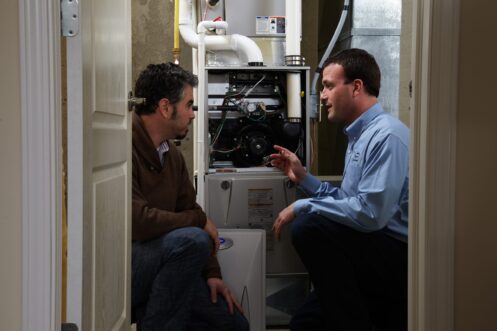If you’re considering your options for a new heating system in Atoka, TN, you have plenty to choose from. However, two of them will likely stand above the rest. One is a gas-fired furnace, and the other is a heat pump. The former has been the dominant heating system in the US for decades. The latter is a newer option that’s rapidly gaining market share. Here’s what you need to know to choose between the two.
Gas-Fired Furnace Basics
The first gas-fired furnace appeared in 1918. Since then, they’ve become one of the most popular heating systems in the country. As of 2020, approximately 58 million US households, including about one in three Tennessee homes, relied on natural gas furnaces. Part of the reason for that is the relatively low cost of natural gas. It makes gas-fired furnaces one of the cheapest heating solutions available. Plus, decades of advances in furnace design make current models safe and highly reliable.
The Advantages of Gas-Fired Furnaces
The average modern gas furnace operates at approximately 81% efficiency. That might not sound like much, but when combined with cheap natural gas, it’s a big deal. It guarantees that operating costs remain lower than practically any other heating option. There are also condensing gas furnaces that can reach efficiencies as high as 98.5%. Gas furnaces also have a relatively low upfront cost, further bolstering their economic advantages. The only time this is not true is if your home doesn’t already have preexisting natural gas service, which would be a costly addition.
Gas furnaces also operate at high temperatures. That makes them ideal for driving the chill out of your home in the winter. With a gas furnace, you can expect air output to be between 120 and 140 degrees Fahrenheit. That’s hot enough to handle the coldest winter night with ease.
The Disadvantages of Gas-Fired Furnaces
The main drawback of natural gas furnaces is that they make your home dependent on both natural gas and electricity. Without gas, your furnace can’t function, and without electricity, it can’t turn on. Additionally, gas furnaces, while safe, do come with some risk. After all, they involve controlled combustion inside your home. That means their fire risk isn’t zero, and they can release carbon monoxide into your home if they malfunction.
Heat Pump Basics
Heat pump technology dates back to the late 1800s, but it didn’t gain widespread residential use until the 1950s and 1960s because they weren’t efficient. Heat pumps collect heat energy from the outside air to use for heating indoor spaces. Earlier versions of the technology simply required too much electricity to make the process feasible in a home. However, today’s heat pumps are another story. They can reach efficiencies that no other system can match. And since heat pumps share a form factor with conventional central ducted HVACs, they’re a perfect drop-in replacement for one.
The Advantages of Heat Pumps
The most significant advantage offered by heat pumps is their energy efficiency. In ideal conditions, they can reach up to 400% efficiency, which is over four times that of a gas furnace. They also operate exclusively on electricity, which means you can pair one with a generator or solar installation. In that configuration, your home would have reliable heat even during a grid failure.
Installing a heat pump also gives you a cooling system, since there are models with both heating and AC modes. Some homes can replace a furnace and a central AC with one heat pump. That can simplify your HVAC maintenance needs, since you’d only have to maintain a single system. You should also know that heat pumps are entirely safe to operate, since they use no fuel.
The Disadvantages of Heat Pumps
One notable disadvantage of heat pumps is that air-sourced systems can struggle in extremely cold weather. However, most remain more efficient than the average gas furnace at temperatures as low as 20 degrees Fahrenheit. Fortunately, we don’t experience too many days each year with temperatures that low. However, on the few occasions that we do, a heat pump might need to activate a backup heat source. Most rely on electric resistance heat strips for that purpose, and they can send your electricity bills soaring.
Heat pumps are also significantly more expensive than gas furnaces. They can cost twice as much as a basic gas furnace installation. While there are some rebates and tax credits available to lower the cost of a heat pump, there’s no guarantee that you’ll qualify for any or all of them.
Making the Right Choice
There’s no wrong choice when it comes to gas-fired furnaces and heat pumps here in Atoka. The option you choose may depend on personal preference. In any case, you can count on the experts here at Infinity Heating and Air Conditioning to help you choose wisely. When you’re ready for a new heating system in your Atoka home or need HVAC repairs or maintenance, contact our team at Infinity.




